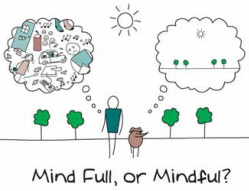Mindfulness or Mindlessness?

We can perceive reality in two ways: reality as it is or what we are assuming, guessing, interpreting, worrying, believing 100%, etc. about reality as it is. It's the second way that can create great suffering for people and often what brings a person into therapy. DBT and other mindfulness-based cognitive and behavioral therapies help clients learn, through a wide variety of skills and strategies, how to understand and become more aware of their internal thoughts and feelings while being able to respond more effectively and accurately to themselves and situations rather than react in unhelpful, sometimes automatic and habitual ways.
Dialectical Behavioral Therapy (DBT)
Developed by Dr. Marsha Linehan and her colleagues at the University of Washington, DBT is an evidence-based therapy combining cognitive-behavioral theory with mindfulness-based principles and practices. With a foundation in acceptance, validation, and change, DBT is a engaged, skills-based therapy that helps people learn to cope in 4 specific areas: Core Mindfulness/Reality Acceptance Skills; Emotion Regulation; Distress Tolerance, and Interpersonal Effectiveness.
- Core Mindfulness/Reality Acceptance skills teach how to work with attention - specifically how to "step back" and observe, notice non-judgmentally what is happening internally and/or externally; choose what to focus on and what not to focus on, engage and participate (rather than avoid) with awareness in the present moment.
- Emotion Regulation teaches how to understand, identify, and manage emotions (especially strong ones) rather than have emotions manage you. Emotion regulation also looks at the role of postive emotions, teaches how to build emotional resilience and reduce emotional vulnerability, and figure out how to have a feeling, but not necessarily react from that feeling (mood-dependent behavior), instead choosing an effective response.
- Distress Tolerance is about how to get through a really, really tough time, without making matters worse. Sometimes emotional and physical pain in life is unavoidable and we can't change it in the moment (or in the moments to come).....learning how to accept and figure out how to cope with - not avoid - very challenging crisis times is the focus of the distract, improve, self-soothe, pros/cons and radical acceptance skills that make up the Distress Tolerance skills set.
- Interpersonal Effectiveness teaches how to navigate relationships more skillfully while maintaining our connections to others, keeping our self-respect, while getting what we need and want. We inevitably need and want things from other people and other people need and want things from us. Asking for what we want, being heard, and having to say no (or having someone say no to us) can be very stressful and lead to difficulties in communication and relationships. Interpersonal Effectiveness skills focus on helping us understand what's getting in the way of being more effective in interpersonal relationships while giving specific and concrete strategies that help us negotiate these relationships with more success.
Other Mindfulness-Based Cognitive Behavioral Therapies
Acceptance and Commitment Therapy (ACT - developed by Steven C Hayes, Kelly Wilson, and Kirk Strosahl) and Compassion Focused Therapy (developed by Paul Gilbert) are two other mindfulness-based therapies that focus on emotion regulation. ACT uses acceptance and mindfulness techniques along commitment and behavioral activation strategies to create psychological flexibility in a person's experience of themselves and their thoughts and feelings in the present moment, leading to more value-based and effective choices. www.contextualscience.org/act
Compassion Focused Therapy is an integrated and multi-model approach that teaches individuals through Compassionate Mind Training how to develop and work with inner experiences of warmth, safeness, and soothing with compassion and self-compassion.
http://www.compassionatemind.dk/pdf/Introducing%20Compassion%20Focused%20Therapy.pdf
Between stimulus and response is a space. In that space is our power to choose
our response. In our response lies our growth and freedom." Victor E. Frankl
our response. In our response lies our growth and freedom." Victor E. Frankl

